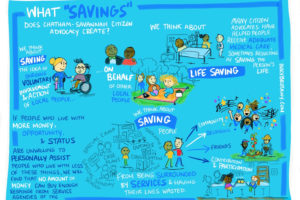What “Savings” Does a Citizen Advocacy Office Create?

Brittany Curry of InkyBrittany recently delved into our archives and developed this graphic illustration from a piece written years ago by Tom Kohler. It’s still speaks to us and we hope it speaks to you. Let us know what you think.
Does citizen advocacy save money? We sometimes get asked that question by folks who are considering offering their financial support. Some people and organizations are interested in data; other people and organizations are interested in examples. Both have their place in describing the work of any organization. Both can be and often are misleading.
When we think about “savings” at Chatham-Savannah Citizen Advocacy, we think about several kinds of savings.
We think about saving and building the idea of ongoing voluntary involvement and action by local people on behalf of other local people. If people who live with more money, opportunity, and status are unwilling to personally assist people who live with less of these things, we will find that no amount of money can buy enough response from service agencies of the government. We have been promoting and engaging people in Savannah in voluntary action on behalf of one another for more than 40 years.
We think about lifesaving. Are there examples of local people who have saved someone’s life through their involvement as a citizen advocate? Yes. Has this saved the federal, state, or municipal government money? Probably not. The government saves money when someone who uses the services it pays for dies. There are certainly times when the actions of individual citizen advocates push service providers to do more; not less. Many citizen advocates talk about experiences they have had in helping their protégé receive adequate medical care, for example.
We think about saving people from becoming “surrounded by services.” It is not unusual for a person with a disability to be served in settings that are overly restrictive and costly.
Sometimes people with an intellectual disability make poor choices about whom they associate with. This leads to being pulled into the criminal justice system, which can cost the person their freedom and safety (jail is a dangerous place for people with disabilities). It also costs a lot of money. Most public officials know the financial costs of operating the various arms of the justice and penal system better than we do. There are many examples of citizen advocates who have helped people with disabilities stay out of jail or avoid languishing in jail awaiting action from the courts.
Sometimes people with physical and other disabilities will be “social worked” out of the hospital into a nursing home because the hospital is under financial pressure to clear the bed when reimbursement ends. This is sometimes called sunset discharge – the patient will be discharged by sunset. There are several examples of citizen advocates who have challenged this practice, which gives the person and their allies more time to organize the supports needed to return to live in their own home or apartment. This saves the person from losing their home and freedom. Decreasing the number of people who are pushed from their homes and into institutions brings about many kinds of savings. Local public officials are likely to be knowledgeable about the financial arrangements that surround publicly supported medical and housing services. We invite them to draw their own conclusions about costs saving given their own knowledge of how public money is spent.
Sometimes a person with a disability needs help managing the ins and outs of everyday life. If confusing interactions with public and private bureaucracies are not clarified, a simple problem becomes a complicated situation, which costs a person peace of mind and costs the bureaucracy time in having to work through a more complicated situation. Having a trusted ally to share questions and concerns with, and to enlist in problem-solving, helps people get on with their lives. This often involves a citizen advocate dealing with the Social Security Administration, the emergency room of a local hospital, or with a physician’s office, or with a caseworker from one of dozens of local agencies.
